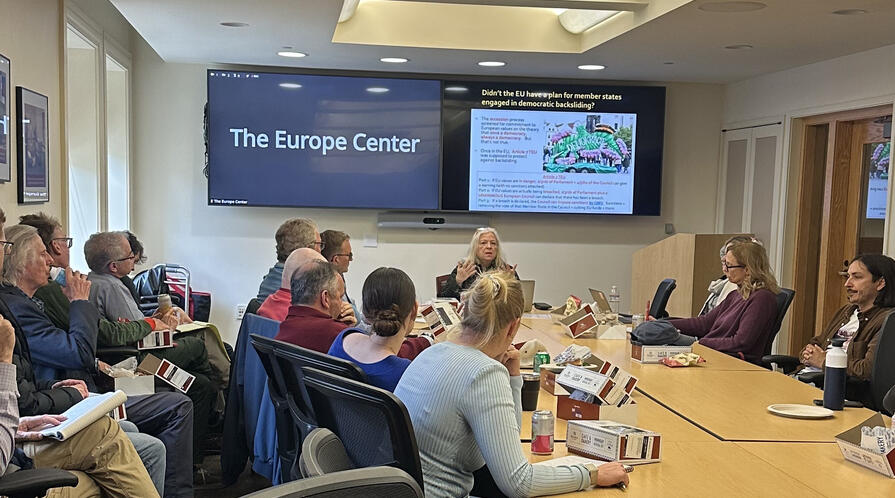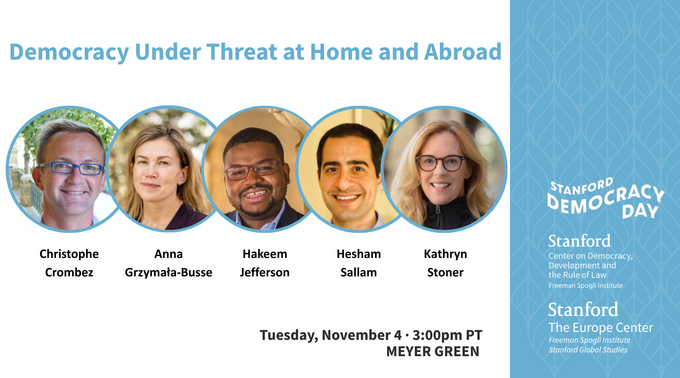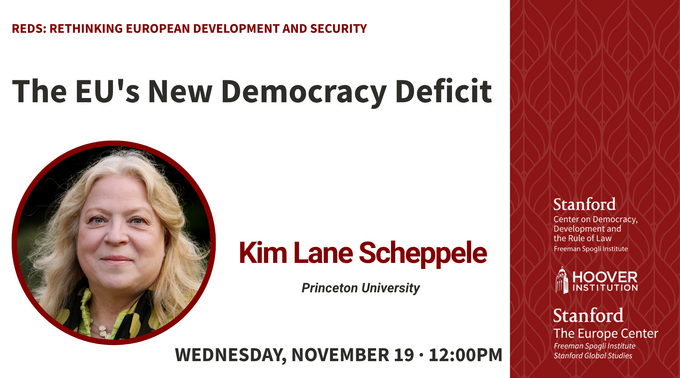Guarding Democracy from Within: The EU’s Struggle Against Internal Democratic Backsliding
In a recent REDS (Rethinking European Security and Development) seminar co-hosted by Stanford’s Center on Democracy, Development and the Rule of Law (CDDRL) and The Europe Center (TEC), Professor Kim Lane Scheppele offered a clear and urgent account of a growing crisis inside the European Union (EU): the erosion of democracy within some of its own member states. Her central claim was that the EU now faces two different democracy deficits. The first is the traditional, institutional problem — often described as the EU being “too technocratic” and “too distant” from voters. The second, and far more dangerous, is the rise of internal democratic backsliding, where member states that were once consolidated democracies begin to dismantle their own checks and balances.
Scheppele began by explaining the older, familiar form of the democracy deficit. Many key EU institutions — the European Commission, the Council, and the European Court of Justice — are not directly elected. The EU historically justified this by assuming that democratic legitimacy flowed upward from its member states. As long as all national governments were democratically elected and accountable at home, the EU’s supranational structure remained legitimate.
But this assumption has collapsed. Over the past decade, some member states, most notably Hungary, and, until recently, Poland, have shifted away from liberal democracy while still enjoying full voting rights and benefits inside the Union. Scheppele emphasized that the EU’s treaties never anticipated a scenario in which a member might stop being a democracy yet continue to shape EU policies, budgets, and laws.
The heart of the talk outlined how Hungary under Prime Minister Viktor Orbán gradually transformed into what scholars call an “electoral authoritarian” regime — a system that holds elections but systematically tilts the playing field. Scheppele detailed how Orbán’s government captured the Constitutional Court, restricted judicial independence, took control of public media, pressured private media owners, rewrote electoral laws, weakened civil society, and used EU development funds to reward loyalists. Despite this, Hungary still nominates a European Commissioner, sends Members of the European Parliament (MEPs) elected under unfair conditions, and holds veto power in the Council of the EU.
Scheppele explained why the EU’s main disciplinary tool, Article 7 of the Treaty on European Union, proved ineffective. Article 7 is designed to sanction members that violate EU values, but the final step requires the unanimous consent of all other member states. Hungary and Poland protected each other for years, making sanctions impossible.
A major turning point came when the EU created three financial conditionality systems: the Rule-of-Law Conditionality Regulation, the Recovery and Resilience Fund, and the Common Provisions Regulation. Unlike Article 7, these tools allow the EU to freeze funds when a member state violates rule-of-law standards. Scheppele noted that these mechanisms froze €137 billion for Poland and €36 billion for Hungary — pressures that contributed to Poland’s democratic opening in 2023 and helped fuel a new political challenge to Orbán.
Still, problems remain. In late 2023, the European Commission released €10.2 billion to Hungary for geopolitical reasons, despite rule-of-law violations. Scheppele warned that such political bargaining undermines the credibility of the new system.
She ended on a cautiously optimistic note: recent EU court decisions suggest that democracy itself, not just technical legal standards, may soon become an enforceable EU obligation. Yet the ultimate question remains one of political will. The EU now has tools to defend democracy from within — but must decide whether it will use them.
Read More

Professor Kim Lane Scheppele offered a clear and urgent account of a growing crisis inside the European Union (EU) during a recent REDS Seminar: the erosion of democracy within some of its own member states.







![Josep Borrell [right] in discussion with Michael McFaul [left].](https://fsi9-prod.s3.us-west-1.amazonaws.com/s3fs-public/styles/707x483/public/2024-05/josep_borrell_eu_democracy_5_hero.png?itok=B_fbY_pc)



![Josep Borrell [right] in discussion with Michael McFaul [left].](https://fsi9-prod.s3.us-west-1.amazonaws.com/s3fs-public/styles/1300x1300/public/2024-05/josep_borrell_eu_democracy_5_hero.png?itok=pM6CT1oe)




![Michael McFaul [left], the director of the Freeman Spogli Institute for International Studies, speaks with Josep Borrell [right], High Representative of the European Union for Foreign Affairs and Security Policy, during an event at Stanford University on May 13, 2024.](https://fsi9-prod.s3.us-west-1.amazonaws.com/s3fs-public/styles/895x498/public/2024-05/josep_borrell_eu_democracy_hero.png?h=c4d9845d&itok=TJ5M_9hJ)









